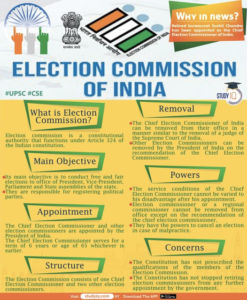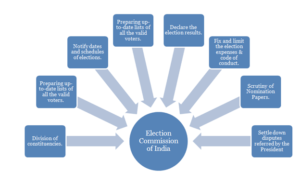The Election Commission — autonomy in the crosshairs
Relevance:
GS Paper- 2: India Polity – Constitutional Bodies
Tags: #upsc #ECI #judiciary #integratedjudiciary #committee.
Why in the News?
- Of late, the Election Commission of India (ECI) has been a focal point of differences between the government and the judiciary. This time, the clash of opinions is over its appointment.
Recent judgment
- The Supreme Court of India, in a judgment, directed that the Chief Election Commissioner (CEC) and the Election Commissioners (EC) will be appointed by the President of India based on the advice of a committee made up of the Prime Minister, the Leader of the Opposition in the Lok Sabha or the leader of the single largest Opposition party and the Chief Justice of India (CJI).
- This judgment of the Constitution Bench was a major step towards broad basing the ECI and enhancing its constitutional status.
- Article 324 of the Constitution contains a provision for such a law to be enacted by Parliament.
The significance
- So far, the top officers of the ECI have been appointed by the President of India on the advice of the central government.
- The Bill seeks to replace the Chief Justice of India from the high-powered selection committee, meaning the committee will be made up of the Prime Minister (Chairperson), Leader of the Opposition in the Lok Sabha (Member) and a Union Cabinet Minister to be nominated by the Prime Minister (Member).
- Experience and research show that incumbent governments, especially those with authoritarian streaks, do not usually do away with democratic institutions but, instead, relentlessly work towards making them pliant.
- The institutional structures remain but are drained of their substance. And, in this case, one is dealing with a matter of electoral winnability and a consolidation of state power.
An issue that has seen much debate
- The procedure of appointments of the CEC and the ECs has seen much debate in policy and political circles ever since the Constituent Assembly debates and much has been written about it.
- A suggestion during the Constituent Assembly Debates was that the appointment of the CEC should be subject to confirmation by two-thirds majority in a joint session of both Houses of Parliament (Constituent Assembly debates, June 15, 1949). However, Parliament was entrusted with the charge of making appropriate laws on the matter.
- The V.M. Tarkunde Committee appointed by Jayaprakash Narayan in 1975, the Dinesh Goswami Committee on electoral reforms set up by the then Prime Minister, V.P. Singh, in the 1990s, and the second Administrative Reforms Commission in its fourth report in 2009 among others made recommendations that the appointments of members of the ECI should be more broad based (through a collegium) than leaving this solely to the government on whose advice the President made these appointments.
Held in high regard
- The ECI has been held to be a reliable, responsible and trustworthy institution by the people of India.
- Handling elections that involve about 900 million voters (2019 election data) through a machinery of 11 million personnel in a setting of economic hardship and inequalities is a remarkable feat.
- However, going soft on the ruling party or its ideology, as the perception is, whether this has to do with election schedules, electoral speeches, alleged hateful propaganda, electoral rolls or other kinds of malpractices, is eroding not only its own autonomy but also people’s trust.
Conclusion
- Nevertheless, the point remains that the present regime still sees the ECI as an institution with autonomy. And this autonomy must be aligned with its goals. It would instead like a firmer grip on the ECI through statutory means.
Source: The Hindu





